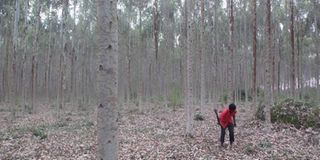Growing trees: A worthwhile investment

A five-year eucalyptus plantation
“If your plan is for one year, plant rice. If your plan is for 10 years, plant trees. If your plan is for 100 years, educate children.” This adage from the Chinese philosopher, Confucius, guides Eden Kamugisha.
The Makerere University graduate is an all-round farmer in Kisagazi Village near Masaka Town. He holds a Bachelor’s degree in Political Science
Twenty years ago, at the age of 32, he quit his job in Prisons Service to become a poultry farmer.
He was the OC Prisons in Masaka. “I was given barely Shs670,000 as my package, which was not enough to start a well-paying business. But my real capital was determination and those who gave me inspiration and guidance,” he says.
Kamugisha was able to get initial 3.7 acres of land, where he established a 30,000-bird poultry farm. It is where he does several income-generating activities. These include growing mangoes, passion fruit and coffee and bee-keeping. There is also production of seedlings for Robusta coffee, cloned eucalyptus, grafted orange, passion fruit, and mango.
About 10 years ago, a friend introduced him to tree farming. “He drove me and my wife, Faustus, to his 30-acre eucalyptus tree plantation and we inspected it. At first, I did not conceptualise the financial potential until a few years later when he told me that he had sold all the trees for over Shs800m, which he had used to build six flats in Kampala for rent.”
Since then, Kamugisha became strongly attracted to trees. He narrates: “When he told me about his big achievement, I had 250 acres in addition to what I already had, so tree growing could be my best investment.
I opted for South African cloned eucalyptus trees since they grow fast. There were 15 acres with pine trees but the eucalyptus proved stronger, faster growing, and very marketable.
I also decided to provide seedlings to other farmers and to expand the acreage.”
Cloned eucalyptus may be ready for harvesting for sale as poles at six to eight years depending on the variety of the tree and the soil where it is planted. If the tree is for timber, the farmer may have to wait for up to 12 years.
Kamugisha explains: “But I want you to imagine the potential benefits. The trees for electricity poles cost at least Shs100,000 each. In an acre, a farmer may grow as many as 450 trees. In just six or eight years, he or she could earn over Shs35m.
If he or she is ready to wait a few more years for the trees to be about a foot or so in diameter, he or she may earn a minimum of Shs500,000 per tree or about Shs250m on selling all the trees.
For farmers with 10 or more acres, planting eucalyptus or any other such tree could be an opportunity to earn billions of shillings in the not-so-distant future.”
So far, Kamugisha has planted 35 acres of cloned eucalyptus trees and is determined to cover the rest of his land with it.
“Growing trees is no longer optional by the way,” he adds.
“Look at the effects of climate change and the rate of deforestation. Be you a trader or a crop or livestock farmer, you need rain in one way or another.”
Rain has a correlation with trees. Uganda is fast losing its forest cover, yet it has a huge demand for house construction and for furniture. Wood is the raw material for making paper and other products.
Agriculture in the Masaka sub-region may never be the same as it was before the destruction of the massive natural forest in Ssese Islands/Kalangala District. There used to be more rain than now.
For a farmer who gets thousands of eggs from the poultry farm every day and who also generates income from the other activities, tree growing is perhaps be the best way to invest the earnings.
“The eucalyptus trees are planted in lines and with a spacing of 10 by 10 feet. Just a handful of organic manure may be needed per hole at the time of planting.
Then, the farmer may do some weeding and clearing of the nearby bush to avoid incidents of bush fires destroying the young trees.
After about a year or two, there will be hardly any weeds. The farmer will just watch the trees grow and wait for the time of harvest.”
Kamugisha and his wife Faustus are fully involved in all the family business activities. They often work together with their 20 or so employees.
The workers are taught to do grafting of seedlings and cloning of eucalyptus trees.
“Most of them are young and even if they have to leave us, they go away with some skills to help them earn a living on their own,” Faustus points out.
Each cloned eucalyptus seedling prepared at their farm is Shs500 while each grafted mango, orange and passion fruit seedling is Shs300.
The farmers keep bees not just for the sake of harvesting honey but also to enhance pollination on the farm where the family also grows maize, beans other food crops.




